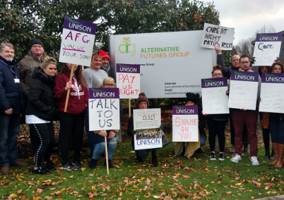Leaders at social care charity Alternative Futures Group (AFG) have said they plan to campaign about the sector's underfunding on a national level as a pay dispute with its staff continues.
AFG has been embroiled in a dispute with its staff over sleep-in shift pay but the charity's leaders have told Civil Society News that it is now subsidising local authority contracts by up to £4m per year and that this cannot continue.
Care workers employed by AFG will take part in a seven-day boycott of overnight on-call sleep-in shifts from today as talks between the charity and workers’ union Unison are yet to reach agreement.
The charity estimates that some 93 of its staff will not work sleep-in shifts between 10pm this evening and 7.30am on Monday 25 March.
In addition, a delegation of AFG workers will attend a demonstration tomorrow outside the charity’s headquarters in Prescot, Merseyside.
AFG workers will also attend a Parliamentary lobby at Westminster on Wednesday to highlight their concerns to MPs.
This follows a weekend's strike earlier this month in which the charity said 191 of its workers took part.
Paddy Cleary, Unison North West regional organiser, described the cut in pay for staff introduced by AFG as “needless and damaging”.
He said: “AFG staff are taking strike action because their employer refuses to see sense. The staff care very deeply about the service users, and they see AFG’s management of the service driving experienced staff out of the care sector.
“There is an urgent need to get this matter resolved and for AFG to pay staff the sleep-in top-up payments that they need. They deserve so much more and it is the very least that AFG should do.”
Funding shortfall
The dispute began last November when AFG told its 2,500 staff that it plans to cut their pay for sleep-in shifts following a Court of Appeal hearing involving Mencap, which ruled in July 2018 that workers on these shifts were not always entitled to the full minimum wage.
The Court of Appeal judgment overturned previous court rulings from 2016 and 2017 that said sleep-in shift workers should be entitled to the full minimum wage rather than a flat-rate of about £30-£40 for a shift.
These previous rulings had led many social care charities, such as AFG, to pay their sleep-in shift workers top-up fees to bring them in line with the minimum wage.
The charity wrote to workers saying it would stop paying top-up fees because it was “highly likely that our commissioners will stop paying AFG a rate which would allow us to continue to make top-up payments”.
It has since said that its commissioners have not cut funding since the Court of Appeal ruling but that they had never fully funded them in the first place.
The charity estimates that it has paid an unfunded £8.1m to workers since it started top-up payments in 2015.
It made a net deficit of £3.1m in the year to March 2018, although its latest accounts say the main reason for this is a revaluation of its properties.
Lack of sector leadership
AFG told Civil Society News it was likely the industrial action would continue because it was not in the charity’s “gift to do anything about it”.
Ian Pritchard, acting chief executive of AFG, said the charity was planning a national campaign on social care underfunding because of a lack of leadership on the issue elsewhere in the sector.
He said: “We are certainly not seeing any leadership from any single provider or any group of providers or voluntary associated provider network.
“Clearly that is failing to get to the heart of the matter. We are considering our position on whether we should take a leadership role on championing underfunding.”
Reviewing contracts
Kirsty Muldoon, the AFG’s director of people and organisational development, said the charity would be reviewing the viability of its contracts with local authorities as funding has not increased with rises in wages.
She said: “We haven’t [dropped contracts] yet but we are setting our budget for the new financial year and once that process is completed by our board at the end of March, we will be doing a contract viability review.”
Muldoon said until three years ago the charity had paid staff “10 or 20 pence” above the minimum wage but it had not been able to continue doing so as the rates increased.
She said the charity had assessed that cost has increased by 5.8 per cent each year while funding from commissioners had only grown by between 2 and 3 per cent.
Since that charity started paying top-up fees for sleep-in shifts in 2015, the charity said it has been subsidising contracts by £2m to £4m each year.
Charities urge government action
Elsewhere, the Voluntary Organisations Disability Group (VODG) has urged the government to clarify its position on what rate it expected sleep-in shifts to be paid at.
Uncertainty over the funding increased last month when the Supreme Court announced that it would hear an appeal from Unison to the previous Court of Appeal ruling.
VODG published a position statement today warning that commissioners could cut funding for sleep-in shifts following the Court of Appeal ruling.
It said: “The current legal situation is that the national minimum wage does not apply for time spent asleep and available at work, and regulations regarding pay currently only apply when staff are awake for working purposes.
“However, this could change now Unison is granted its recent Supreme Court application to challenge the Court of Appeal judgment.
“We have grave concerns that the absence of clear regulations for the payment of overnight sleep in work will lead the social care market to operate in ad hoc and uncoordinated ways. We fear this will lead to inconsistent commissioning and provision arrangements locally.”
|
Related articles











